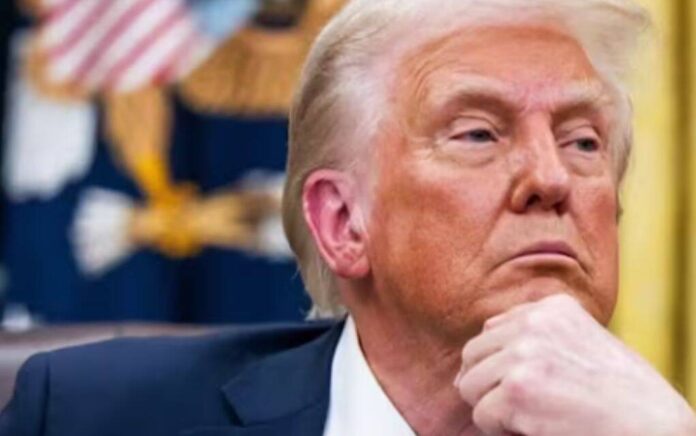
The justices on the Supreme Court have made some big rulings recently. But perhaps none bigger than this.
And the Supreme Court has handed down a ruling that changes everything for the Trump administration.
Supreme Court Greenlights Trump’s Deportation Push Under Historic Law
In a pivotal ruling on Monday, the Supreme Court cleared the path for the Trump administration to restart deportations of suspected Venezuelan gang members, relying on a rarely invoked law from 1798 known as the Alien Enemies Act. The 5-4 decision overturned a lower court’s block, marking a significant win for President Trump’s immigration agenda.
The high court’s conservative majority found that the administration was “likely to succeed on the merits” in a legal battle originating in a Washington, D.C., district court. That case challenged the deportation of five Venezuelan men under the centuries-old statute. “The detainees are confined in Texas, so venue is improper in the District of Columbia,” the majority opinion stated, pointing to a jurisdictional misstep in the initial lawsuit.
Beyond the technicalities, the justices emphasized a key safeguard: anyone targeted for deportation under the Alien Enemies Act must receive notice “within a reasonable time and in such a manner as will allow them to actually seek [a court hearing] in the proper venue before such removal occurs.”
The opinion pushed back against dissenting voices, asserting, “For all the rhetoric of the dissents, today’s order and per curiam confirm that the detainees subject to removal orders under the AEA are entitled to notice and an opportunity to challenge their removal. The only question is which court will resolve that challenge.”
The saga began last month when D.C. District Court Chief Judge James Boasberg halted Trump’s use of the wartime law, issuing a temporary restraining order that he later extended through at least April 12. The administration, undeterred, raced to the Supreme Court with an emergency appeal on March 28 after a split D.C. Circuit panel declined to intervene.
Trump’s revival of the Alien Enemies Act—the first since World War II—targets alleged members of the Venezuelan gang Tren de Aragua, whom he aims to send to a sprawling mega-prison in El Salvador. The president has framed the gang as an invading threat, blaming lax border policies under the Biden administration for their foothold in the U.S.
Celebrating the ruling on Truth Social, Trump declared, “The Supreme Court has upheld the Rule of Law in our Nation by allowing a President, whoever that may be, to be able to secure our Borders, and protect our families and our Country, itself.” He capped the post with, “A GREAT DAY FOR JUSTICE IN AMERICA!”
The court’s three liberal justices, however, painted a starkly different picture. They accused the administration of dodging Boasberg’s initial order by attempting to deport the migrants before a March 15 hearing that led to the block.
Justice Sonia Sotomayor, in a fiery dissent, criticized the majority for ignoring “the grave harm Plaintiffs will face if they are erroneously removed to El Salvador or regard for the Government’s attempts to subvert the judicial process throughout this litigation.”
She added, “Because the Court should not reward the Government’s efforts to erode the rule of law with discretionary equitable relief, I respectfully Dissent.”
Sotomayor also took aim at Trump’s approach, noting, “Congress requires the President to ‘mak[e] public proclamation’ of his intention to invoke the Alien Enemies Act. President Trump did just the opposite. In what can be understood only as covert preparation to skirt both the requirements of the Act and the Constitution’s guarantee of due process.”
She suggested the administration sought to rush the deportations before courts could weigh in. Justice Amy Coney Barrett, a Trump appointee, aligned with parts of this dissent, adding a twist to the ideological split.
The ruling sparked swift reactions from Trump’s inner circle. Attorney General Pam Bondi vowed that she, alongside Homeland Security Secretary Kristi Noem and “border czar” Tom Homan, would “direct our assets to scour the country for any remnants of Tren De Aragua and DEPORT THEM.”
Calling it a “landmark victory for the rule of law,” Bondi argued, “An activist judge in Washington, D.C. does not have the jurisdiction to seize control of President Trump’s authority to conduct foreign policy and keep the American people safe.”
Noem echoed the sentiment, warning, “It is a bad day to be a terrorist and criminal alien in the United States of America.” She hailed the decision as a “victory for commonsense security,” pledging to wield all available tools—including the Alien Enemies Act—to overhaul the immigration system. “Thank you President [Trump] for your leadership,” she added.
For now, the administration’s efforts funnel suspected gang members to El Salvador’s infamous Terrorist Confinement Center, a facility known for its brutal conditions. As the legal dust settles, the Supreme Court’s ruling has handed Trump a powerful tool—and a renewed mandate—to press his hardline immigration vision forward.
Stay tuned to The Federalist Wire.



















